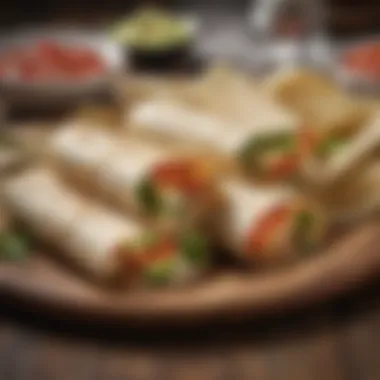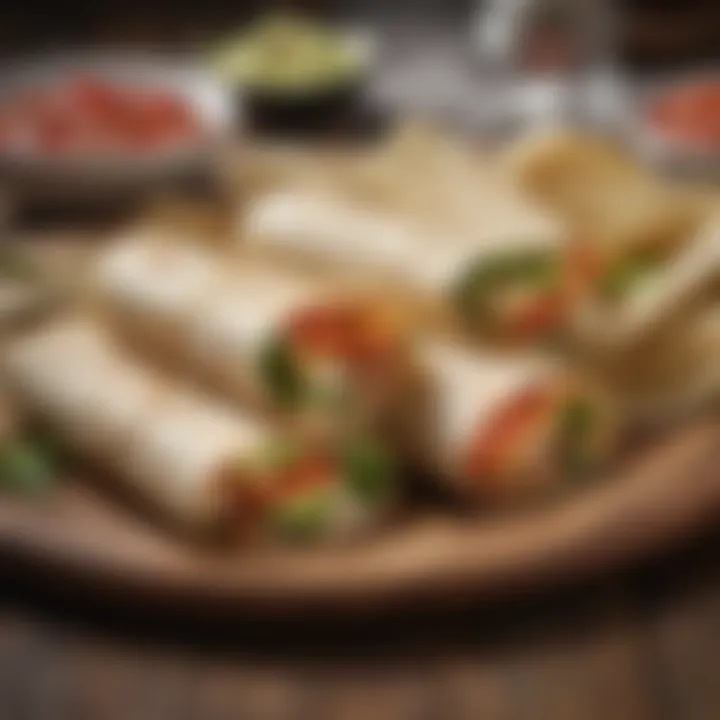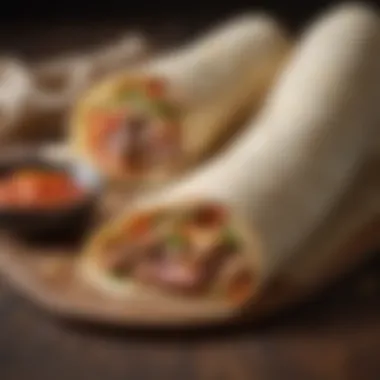Understanding Carbohydrates in Tortilla Wraps


Intro
Tortilla wraps often find their way onto our plates, from quick lunches to elaborate dinners. They’re not just a convenient vessel for our favorite fillings; they also hold varying nutritional values, particularly when it comes to carbohydrates. Understanding the carbohydrate content in these wraps is key for anyone looking to fine-tune their diet, whether they are watching their weight, managing diabetes, or simply pursuing a more balanced lifestyle.
This article will break down the many facets of tortilla wraps, offering insights into their composition, variation based on ingredients, and practical ways to incorporate them into meals. Moreover, we will tackle how factors such as fiber and protein influence overall health, and provide actionable advice for those attentive to their carbohydrate intake. Let’s dive in!
Preamble to Tortilla Wraps
When we think about the vast world of culinary delights, tortilla wraps often stand out as a beloved favorite. These practical and tasty creations serve not just as a food product but also as a versatile canvas for countless meals. In this article, we will delve deeply into what makes tortilla wraps a staple in many diets around the globe. The importance of understanding their carbohydrate content, nutritional value, and flexibility in meal preparation cannot be overstated.
Tortilla wraps come in various forms and flavors, each with its unique characteristics. They can be used in many cuisines, from Mexican to Mediterranean, offering diverse options that cater to different tastes and dietary preferences. Moreover, for those who are tracking their carbohydrate intake, it’s essential to grasp how tortilla wraps fit into their dietary choices.
Defining Tortilla Wraps
Tortilla wraps consist mainly of a thin, flatbread made from corn or wheat. The base ingredient is often mixed with water and salt, then rolled out and cooked on a hot surface. The cooking method gives tortillas their distinct texture and flavor, a balance that can range from chewy to crispy depending on preparation.
Typically, there are two main types of tortillas: flour and corn. Flour tortillas are generally softer and more pliable, making them ideal for burritos and quesadillas, while corn tortillas are denser and lend themselves well to tacos and enchiladas. Knowing the difference isn't just about texture or taste — it directly links back to their carbohydrate content, which is a vital consideration for anyone looking to manage their dietary habits effectively.
Culinary Versatility
Tortilla wraps have proven to be incredibly versatile across different culinary landscapes. They can easily adapt to various fillings and cooking styles, making them a favorite for home chefs and professional cooks alike.
Here are some common uses of tortilla wraps:
- Quesadillas: filled with cheese and other ingredients, grilled until melted and crispy.
- Burritos: generously stuffed with rice, beans, meats, and sauces, then wrapped tightly.
- Tacos: often made using corn tortillas, filled with fresh vegetables and protein.
- Pinwheels: these are great for appetizers, where tortillas are spread with cream cheese and rolled with sliced meats and veggies.
- Wrap sandwiches: a healthier alternative to traditional bread, tortillas can be filled with various proteins, salads, and spreads.
The appeal of tortilla wraps lies not just in their taste but also in the convenience they offer. They can be quick to prepare, making them a go-to for busy individuals or families. Furthermore, they can cater to specific dietary needs. For instance, whole wheat or low-carb tortillas provide healthier options for those looking to reduce their carbohydrate intake while still enjoying the familiarity of a good wrap.
Understanding Carbohydrates
Carbohydrates are a fundamental macronutrient in our diet, serving as a primary energy source. In the context of tortilla wraps, understanding carbohydrates isn't just a matter of counting grams; it involves appreciating their role in nutrition and how various types impact overall health. This article dives into the different forms of carbohydrates, elucidating their significance in our daily meals and particularly how they influence tortilla wraps, ensuring readers can make informed choices regarding their dietary plans.
Types of Carbohydrates
When it comes to carbs, they can generally be tossed into two buckets: simple and complex. Each serves distinct purposes in our everyday eating habits, particularly in culinary delights like tortilla wraps.
Simple Carbohydrates
Simple carbohydrates are often short-lived burst of energy and tend to be easily digestible. Think of foods like sugar, honey, and certain fruits. Their key characteristic is their quick absorption, providing an immediate fuel source for our body. In the context of tortilla wraps, simple carbs can be found in some sauces or fillings that contain added sugars. While they may give you a quick pick-me-up, relying too heavily on simple carbohydrates might lead to a rapid energy crash later.
The unique feature of simple carbohydrates—namely their quick digestion—means they can be beneficial for quick energy pursuits, but they don't offer lasting satiety. Thus, a healthy balance should be upheld when integrating them into tortilla fillings and spreads that might overshadow more nutritious components.
Complex Carbohydrates
Complex carbohydrates are the stalwarts of sustained energy, composed of longer chains of sugar molecules. Foods rich in complex carbs—like whole grains, legumes, and certain vegetables—are digested more slowly, leading to a gradual release of energy. This is particularly advantageous in the context of the nutritional composition of tortilla wraps. When made from whole grain flour or enriched with vegetables, complex carbs not only provide steady energy but also promote feelings of fullness, aiding in weight management. Moreover, complex carbohydrates often come packed with other nutrients like fiber, vitamins, and minerals, amplifying their health benefits. This is where the unique advantage of complex carbs shines; they contribute to a balanced diet while also enhancing the flavor and texture of tortilla wraps.
Role of Carbohydrates in Diet
Carbohydrates are often portrayed in a negative light, particularly in low-carb diet trends. However, they are essential for overall health, especially when considering their role in the everyday diet. Carbohydrates are the primary energy source for our brain and muscles, making them crucial for physical performance and cognitive function. It’s vital to recognize that not all carbs are created equal. Choosing those from whole, unprocessed sources—such as grains used in tortillas—ensures a wealth of nutrients that support bodily functions.
It's imperative to integrate a diverse array of carbohydrates into one's diet, especially in meals involving tortilla wraps. By opting for fiber-rich fillings and complex carbs in your wraps, you can cultivate a more balanced approach, satiating hunger while maintaining energy levels for longer periods.
"A balanced approach to carbohydrates paves the way for not just managing weight but also fostering long-term well-being."
Thus, understanding the distinction and function of different types of carbohydrates helps consumers make educated choices about their meals, especially when it comes to incorporating tortilla wraps into their diet.
Nutritional Composition of Tortilla Wraps
Understanding the nutritional composition of tortilla wraps is critical for anyone looking to make informed dietary choices. Tortilla wraps are more than just convenient carriers for various fillings; their nutritional profile can significantly impact one’s overall health. With the increasing popularity of wraps in diets, knowing the carbohydrate content, fiber, protein, and the quality of ingredients used becomes essential.
Standard Tortilla Wrap Carbs
The carbohydrate content in standard tortilla wraps varies significantly depending on the type of tortilla chosen. A typical 10-inch flour tortilla can have anywhere from 22 to 30 grams of carbohydrates. On the other hand, a corn tortilla, which is often smaller, generally contains about 12 to 20 grams of carbohydrates per 6-inch round.
Carbohydrates serve as the primary energy source for the body, but the key is understanding not just the quantity but the quality of these carbs. For example, while both flour and corn tortillas contain carbs, their glycemic index differs. Corn tortillas tend to have a lower glycemic index, making them a better option for those looking to manage their blood sugar levels. Incorporating information about standard carb counts can enable readers to tailor their meals according to their dietary needs.


Nutritional Variability
Ingredients Impact
The impact of ingredients on the nutritional quality of tortilla wraps cannot be overlooked. Tortillas made with whole grains, for example, have higher fiber content compared to their white flour counterparts. Fiber plays a crucial role in digestive health, and it also aids in stabilizing blood sugar levels. The specific ingredient choices, such as whether to opt for enriched flour versus whole wheat, directly influence the wrap's nutritional density.
Using low-sodium ingredients or incorporating healthy fats, such as avocado, can further enhance the health benefits of tortilla wraps. This choice is particularly favorable for those wanting to indulge while still maintaining health consciousness. The unique feature of ingredient impact relates to the ability to customize wraps for better nutrition, catering to personal dietary restrictions or preferences.
Size Matters
The size of the tortilla also matters tremendously. A larger tortilla often has proportionately more carbohydrates. For instance, while a 10-inch flour tortilla packs about 30 grams of carbs, a smaller, 6-inch version may only hold around 15 grams. This specific aspect creates numerous opportunities for portion control. A smaller tortilla can be ideal for those monitoring their carbohydrate intake or attempting to lose weight.
Reducing the size of the tortilla means individuals can enjoy the fillings they love without going overboard on calories or carbs. This variability is practical, allowing culinary enthusiasts to adapt their meals to their lifestyle and health goals.
"Understanding the inherent nutritional variability in tortilla wraps is fundamental for those wishing to succeed in balancing flavor with their dietary intentions."
In summary, the nutrition composition of tortilla wraps is multi-faceted, influenced by both the chosen ingredients and their size. Through mindful selection, consumers can significantly improve the nutritional outcome of their meals.
Types of Tortillas
Tortillas are more than just a vessel for your favorite fillings; they are a canvas that reflects culinary traditions and dietary preferences. Knowing the different types of tortillas gives a clearer picture of their carbohydrate content, flavors, and nutritional profile. Each tortilla variety serves distinct culinary purposes and nutritional considerations. By digging deeper into the nuances of each type, one can better appreciate how tortillas fit into various dietary patterns. Let's explore the varieties that can elevate or complicate your meals depending on your choices.
Flour Tortillas
Flour tortillas are soft and pliable, making them universally loved for wraps, burritos, and quesadillas. Made typically from refined wheat flour and fat, they tend to have a higher carbohydrate content when compared to other types. For instance, a standard 10-inch flour tortilla can clock in at around 30 grams of carbs. However, they do provide a certain richness and texture that many people crave.
When considering flour tortillas, keep in mind that their overall healthiness can depend on the refining process of the flour used. Whole wheat flour tortillas exist, carrying a better nutritional profile than their white flour counterparts, containing more fiber and potentially lower glycemic responses.
Corn Tortillas
Corn tortillas are often hailed for their distinct flavor and versatility. Made from nixtamalized corn, they not only offer a unique taste but also tend to be lower in carbohydrates than flour tortillas; a typical 6-inch corn tortilla contains about 15 grams of carbs. This lower carb count makes corn tortillas a favorable choice for those keeping tabs on their carbohydrate intake.
Besides their lower carbohydrate content, corn tortillas pack a nutritional punch with more fiber and a few additional vitamins, thanks to the corn base. They also contribute to a lower calorie intake in meals, making them a staple in many traditional dishes. For anyone looking for a gluten-free option, corn tortillas easily fit that bill as well.
Whole Wheat and Alternative Options
When it comes to meeting different dietary needs, whole wheat and alternative tortillas come to the forefront. Whole wheat tortillas are a step up from regular flour versions as they retain the bran and germ, boosting their fiber content. They generally have a similar carb content to white flour tortillas, but the added fiber helps in digestion and offers a more gradual impact on blood sugar.
Gluten-Free Choices
For those with gluten sensitivities or celiac disease, gluten-free tortilla options can be a game-changer. Often made from ingredients like almond flour, coconut flour, or commercial gluten-free blends, these tortillas can contain a variety of flavors that enhance culinary experiences.
The key characteristic of gluten-free tortillas is their adaptability; they can be used in numerous recipes without the worry of gluten content. One must, however, be mindful of their carbohydrate content, as some gluten-free options can use starches, leading to higher carb numbers in some cases. While these choices are increasingly popular due to dietary restrictions, they may not always mimic the texture of traditional tortillas.
Low-Carb Variants
Low-carb tortillas are gaining traction for their practicality and health-conscious design. These tortillas are generally crafted from alternative ingredients like cauliflower or flax seed meal, aiming to deliver significant lower carbohydrate counts—sometimes as low as 4 to 6 grams per serving.
This makes them appealing for those on ketogenic or low-carb diets, providing the satisfaction of wraps or burritos without piling on the carbs. The unique feature of these tortillas lies in their formulation, which often offers more fiber while maintaining minimal carbs, contributing positively to satiety. Just be aware, some low-carb varieties may have different flavors or textures that might take some time to get used to.
"Understanding the various types of tortillas is essential for anyone looking to manage their carbohydrate intake effectively while enjoying diverse flavors in their meals."
With such a varied landscape, consumers can select tortillas that suit both their taste and nutritional objectives, setting the stage for informed and satisfying culinary choices.
Fiber and Protein Content
Tortilla wraps have carved their niche in culinary delights, but beyond their carbohydrate profile lies the importance of fiber and protein. Both of these nutrients play a crucial role in delivering health benefits and supporting overall wellbeing. When we discuss the carbohydrate content of these wraps, we cannot overlook how fiber and protein influence both nutrition and satiety.
Importance of Fiber


Fiber is a powerhouse when it comes to diet. It's like that unsung hero in food, often overlooked but absolutely critical. Basically, fiber can manage to bring a heap of benefits for our digestive system. It helps keep things moving smoothly, reducing the likelihood of constipation. Moreover, high-fiber foods are linked to lower cholesterol levels, making it a good friend for heart health.
When it comes to tortilla wraps, the type of flour or corn used can significantly affect fiber content. Whole wheat wraps, for instance, pack a fiber punch compared to those made from refined flour. This fiber richness may not just cut cravings but also lead to a slower release of sugars into the bloodstream. Curbing those sugar spikes can be valuable, especially for folks keeping an eye on blood sugar levels.
In practical terms, choosing a wrap with ample fiber can leave you feeling fuller for longer, which is splendid for managing weight. You might consider a wrap that boasts at least 5 grams of fiber per serving. It can be an excellent addition to a meal plan aimed at improving health without intensive caloric intake.
"High-fiber foods not only provide bulk, but they also promote a healthy gut and assist in better nutrient absorption."
Protein in Tortilla Wraps
Now let’s switch gears to protein, another key player in crafting a balanced meal. People often focus on carbs or fats, but without sufficient protein, meals can fall short of their nutritional potential. Protein contributes to muscle repair, enzyme production, and simply balancing energy levels throughout the day. It is a popular choice for anyone engaged in active lifestyles.
In tortilla wraps, protein doesn't necessarily come from the wrap itself, but rather, it’s about what you pile inside. Flour tortillas might have a bit of protein due to their wheat content, but they won’t match the bounty from fillings like chicken, beans, or cheese. Combining these ingredients is essential for making wraps nutritious.
For example, a basic chicken and cheese wrap can reach upwards of 30 grams of protein, depending on serving sizes. This is beneficial, particularly if one is looking to support muscle growth or maintain muscle mass during weight loss.
Moreover, lean proteins are recommended for those who are health-conscious. Using grilled chicken, turkey, or plant-based proteins can make a flavorful and protein-rich wrap without the extra fat.
Influence of Fillings and Sauces
When considering tortilla wraps, it’s easy to overlook the role that fillings and sauces play in determining nutritional value, particularly carbohydrate content. These components can elevate a simple tortilla into a meal that is not just filling but also nutritionally diverse. By carefully choosing these elements, one can create wraps that resonate well with dietary goals, whether one is aiming for increased protein, enhanced fiber, or a delightful burst of flavor.
Common Fillings
Proteins
Proteins are the building blocks of life, and when it comes to tortilla wraps, they offer not only substance but also a range of health benefits. Popular choices include grilled chicken, ground turkey, beans, or tofu. These options contribute significantly to the overall protein content, making wraps more satiating and nutritionally robust.
Key Aspect: One of the most notable characteristics of protein is its ability to promote muscle repair and growth, making it a popular choice for fitness enthusiasts.
Why it’s Beneficial: By incorporating protein-rich fillings, individuals can create a more balanced meal that supports energy levels and aids in recovery. This can be especially beneficial for those who lead active lifestyles or are monitoring their dietary intake closely.
Unique Feature: A notable advantage of proteins, particularly from lean meats or plant-based sources, is that they tend not to add undue carbohydrates. This makes them an ideal choice for anyone looking to limit their carb intake while still enjoying satisfying meals.
Vegetables
Vegetables are perhaps one of the most versatile components of any tortilla wrap. They bring a crunch and freshness that energizes a meal, and they are packed with nutrients. Ingredients like lettuce, spinach, bell peppers, onions, and tomatoes can add color, flavor, and an impressive array of vitamins and minerals.
Key Aspect: One prominent feature of vegetables is their high fiber content.
Why it’s Beneficial: Fiber not only enhances digestion but also helps keep one feeling full longer. Incorporating a variety of veggies can help reduce the overall caloric density of the meal, ensuring that each bite is nutritious without being heavy.
Unique Feature: One of the disadvantages to consider, however, is that some veggies like corn contain higher carbohydrate levels than others. So, when focusing on low-carb wraps, it's crucial to make thoughtful choices in veggie selection.
Cheeses
Cheese can be a delightful addition to tortilla wraps, adding richness and flavor. Varieties such as cheddar, queso fresco, or mozzarella offer different textures and taste profiles, which can significantly enhance the overall eating experience.
Key Aspect: The appealing characteristic of cheeses is their ability to create a creamy texture, which can offset the dryness of other fillings.
Why it’s Beneficial: Most cheeses are also a source of calcium and vitamins, which are essential for overall health.
Unique Feature: However, cheese does come with a notable impact on the wrap's carbohydrate and fat content. Certain cheeses can be higher in saturated fats, so moderation is key for those seeking to maintain heart health or manage calorie intake.
Sauces and Their Contributions
While fillings often take center stage in flavor, sauces can be what truly ties a tortilla wrap together. A well-chosen sauce not only enhances the taste but can also contribute to nutritional aspects. For example, fresh salsa or guacamole can provide healthy fats and additional micronutrients, while creamy dressing may add unnecessary calories and carbohydrates.
When it comes to sauces, balance is paramount. Seek options that elevate the dish without overshadowing the wholesome ingredients inside. Opt for homemade sauces when possible, allowing for control over added sugars and preservatives.


Ultimately, understanding these fillings and sauces can empower anyone to make more informed choices, ensuring each tortilla wrap becomes not just a meal, but an experience rich in flavor and nutrition.
Carb Counting and Dietary Management
Carbohydrate counting is a practical tool for individuals aiming to manage their dietary intake effectively, especially for those with specific health goals like weight loss or blood sugar regulation. This section delves into not only the mechanics of counting carbs within the framework of tortilla wraps but also the broader implications of incorporating these delicious foods into a stable diet.
Tracking Carbohydrate Intake
Tracking carbohydrate intake is fundamental for anyone mindful of their dietary habits. This practice involves keeping a close eye on the carbs consumed throughout the day, allowing individuals to regulate their intake in accordance with their health objectives.
When it comes to tortilla wraps, knowing the carbohydrate content can help avoid unexpected spikes in blood sugar levels. For example, a standard flour tortilla may contain around 30-40 grams of carbohydrates, whereas a corn tortilla typically has about 15-25 grams. By maintaining a food diary or utilizing apps designed for tracking nutrition, consumers can easily record their meals. This not only promotes accountability but also provides insights into how different types of tortillas and their fillings contribute to overall carb consumption.
Tools for Tracking
- Food Journal: Simple handwritten records can be effective.
- Mobile Apps: Applications like MyFitnessPal or Cronometer can streamline the process——just search for tortillas and log your intake.
- Nutrition Labels: Getting familiar with reading nutrition information on packaging is critical.
Understanding the net carb content, which subtracts the fiber from total carbs, can be particularly useful. Since fiber is not digested, it does not impact blood sugar levels in the same way as other carbohydrates.
Balancing Tortilla Consumption
Balancing tortilla consumption involves finding a middle ground between enjoying these delightful wraps and adhering to dietary needs. It’s about strategy rather than deprivation, allowing one to savor flavors while remaining on track health-wise.
To strike this balance, consider portions and ingredients. Here are some approaches to achieving harmony:
- Portion Control: Instead of having two large tortillas, one could opt for a smaller size or limit oneself to one wrap filled with nutrient-rich ingredients.
- Choose Whole Grain: Whole wheat or corn tortillas typically contain more fiber and nutrients compared to their refined counterparts, offering a healthier option.
- Mind the Fillings: Optimal fillings include lean proteins like chicken or beans, paired with a variety of vegetables for added nutrients and fiber. This combination not only enriches meals but also helps mitigate carb impact due to the slower digestion of fiber and protein.
By being mindful of choices, one can enjoy tortilla wraps without guilt or negative repercussions on dietary goals.
"Balancing carb intake is really about enjoying your food while being realistic about your health needs!"
Practical Tips for Using Tortilla Wraps
Using tortilla wraps can elevate meals in ways that are colorful and delicious. However, knowing how to choose and prepare them correctly is essential. The right tips can not only enhance flavor but also keep health in check. Let’s break down the practical aspects that can help in maximizing the culinary experience with these versatile wraps.
Smart Shopping Tips
When it comes to purchasing tortilla wraps, a discerning eye can make all the difference. First off, read the labels. The first thing is to look for the carbohydrate content right on the packaging. Not all tortillas are created equal. Some wraps might pack more carbs than you expect due to added sugars or fillers.
Here are some things to consider while shopping:
- Ingredients List: Go for whole food ingredients. If you see a long list of additives, it's best to pass.
- Whole Grain Options: Look for tortillas made from whole grains. They tend to have more fiber and nutrients.
- Consider Size: Tortillas can vary in size from mini to oversized. Smaller tortillas often have less carb content.
- Watch for Gluten-Free Products: While gluten-free can be a health trend, they may also contain higher levels of starches that can spike carb content.
"A little homework at the grocery store can save you from a carb overload later on!"
Preparation and Cooking Techniques
Now that you’ve chosen the right wraps, how you prepare them can significantly affect their nutritional value. It’s more than just slapping ingredients together; the cooking method plays a big role.
- Warm Up Your Tortillas: Whether you’re using flour or corn, a brief warm-up in a dry pan can bring out the flavors. Just about 30 seconds on each side will make them more pliable and enjoyable.
- Avoid Excess Oils: Cooking tortillas in oil might seem tempting to increase richness, but it also adds unnecessary fats. If you must, try to use a healthier oil like avocado or olive oil, but sparingly.
- Experiment with Toasting: A slightly charred tortilla can add an earthy flavor. Just ensure you monitor the temperature to avoid burning.
- Storage Matters: To keep your tortillas from drying out, store them in a plastic bag or airtight container when not in use. It'll keep them fresher longer and ready for your next culinary adventure.
By keeping these tips in mind, you stand to not only enjoy the wraps more but also harness their potential in a healthy diet. An informed approach to both shopping and cooking can turn a simple tortilla into a foundational element of delicious and nutritious meals.
End
In wrapping up our exploration of carbohydrate content in tortilla wraps, we find that this seemingly simple food holds a complex nutritional profile that demands attention. Understanding the nuances behind the carbohydrates present in tortillas is fundamental for anyone seeking to make informed dietary choices. Not only do tortilla wraps vary significantly in nutrient composition based on their ingredients and preparation methods, but they also provide a suitable vehicle for various fillings that contribute to their overall healthfulness.
Summary of Nutritional Insights
To summarize, tortilla wraps can be packed with energy, offering a variety of carbohydrates primarily in the form of starches and fiber. For example, flour tortillas generally have a higher carbohydrate content compared to corn tortillas. The individual health goals of consumers should influence their choice of wrap type. Whole wheat tortillas often serve as a better alternative due to their higher fiber content, aiding in digestion and providing a more sustained energy release.
Moreover, the nutrient density of wraps can be enhanced by selecting whole grain or fortified options, which contribute vitamins and minerals. This aspect is especially relevant for those monitoring the nutritional value of their meals. It's essential to recognize the dynamic interplay between the wrap, the fillings, and overall meal balance to optimize health benefits.
Future Trends in Tortilla Wraps
As we glance toward the future of tortilla wraps, trends indicate a growing demand for alternatives that cater to specific dietary preferences, such as keto or gluten-free diets. Innovations in producing tortillas with alternative flours, like chickpea or almond flour, are becoming fashionable, and not just for their lower carbohydrate content, but also for the distinctive flavors they bring.
Additionally, we can expect an emphasis on functional ingredients—those providing added health benefits—such as probiotics or seeds, enhancing the nutritional profile even further. As consumer awareness of nutrition continues to rise, manufacturers will likely respond by optimizing their recipes and promoting transparency regarding carbohydrate content and overall nutritional benefits.







